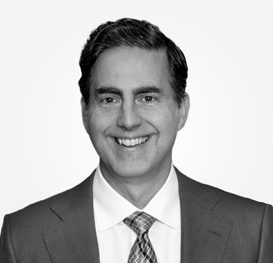What are your key takeaways from participants at this year’s Healthcare conference?
John Hoffman: It continues to be a complex market environment. The S&P 500 is touching all-time highs, but there’s still a lot of concentration on where returns have been generated.
If you think about the healthcare industry and track performance over the last couple of years, you can see a massive divergence between sub-sectors and companies.
In biotech, for instance, if you look at the top 10% of companies that comprise the XBI and compare them to the NASDAQ top 10% performers, you’ll see the differential between those two groups continuing to expand.
From an investor's perspective, that's a great opportunity to redeploy capital into an area that has great defensive characteristics but also allows you to earn alpha if you can be a stock picker against the broad opportunity set.
John Kolz: We’ve been talking a lot recently about the return of stock pickers, and the frustration with being an ‘index hugger’. I think in the Biotech sector, perhaps more than any other, the advantages of having to dig deep and understand a company are as valuable to investors as they’ve ever been.
How has the macro environment become a more prominent topic for investors in the healthcare sector?
Jason Levitz: I think healthcare investors are less oriented to think about things like inflation data, particularly around life sciences, where the focus is on evaluating idiosyncratic stock risks, clinical trials, and probability of success. Ideally, that's where they would like to focus their time. But in today’s world, macro events and the trajectory of the broader market are key topics.
One of the big talking points right now is around long-term value creation and how to build value over a five to 10-year horizon. The question is how much rates matter over that timeline. Because if you're building a company that's going to create billions of dollars of value over an extended period, there's an opportunity there, irrespective of where rates are now or will be in six to 12 months.
What themes are catching the attention of private investors?
John Hoffman: There's a lot of excitement about companies that haven't gone public yet. If you look at the stats, there are plenty of companies with strong balance sheets and the right investor base to support IPOs.
Successful IPOs these days tend to have unique equity stories. So, the addition of a company to the broad biotech public landscape from an IPO adds some element of opportunity or diversification potential for investors that are participating as either crossover investors in those companies pre-IPO or as potential IPO buyers.
There’s also been a lot of investor attention on the performance of the IPO class that has gone public this year, which has been mixed to date. Corporates are equally focused on that mixed performance and trying to interpret what that means for their potential path to the public markets.
John Kolz: The question that arises is what to do when performance has been challenged. How do you rethink your execution strategy? Can you think about club deals or anchor IPO indications from new investors?
I know we all feel passionate about not just following the same playbook that has been that has been executed for years but having to look broader and deeper to try new things, especially when the market is digesting macro or micro disruption it hasn’t necessarily been used to. That brings us to the use of PIPEs, wall crossings, convertibles, and other alternative financing tools that need to be at the forefront of the conversation.
Jason Levitz: I do think there is an untapped opportunity with convertibles, particularly within the life sciences market. It’s an underused product for companies that fit the right profile, such as those in the commercial stage with a market cap of one to two billion or more. I expect to see more of those companies looking at the convertible market as a viable alternative to common equity in this environment.
How is M&A finding its way into conversations with clients?
Jason Levitz: One of the things we heard loud and clear at this year’s conference was that it's not just big pharma that’s active in M&A. There are a lot of mid-size and European pharma firms that are now looking at assets in the $1 to $5 billion range. That spills over into how investors think about generating returns.
The other point I would add from an investor perspective is that in addition to looking for potential candidates, there's also been an element of recycling capital. Most of these transactions are for cash and investors in the mid-cap arena are recycling that cash into new opportunities. We don't always see that with generalist investors in large-cap space. This notion of recycling capital has been an important theme in the first half.
John Hoffman: The other area where M&A plays a significant role in our world is around crafting a strong narrative for your equity story, as that can greatly impact how investors perceive investment opportunities and allocate capital. A key aspect of this concept revolves around determining whether a company is a potential M&A takeout candidate and understanding how that impacts a business's long-term return profile.
Our Experts


